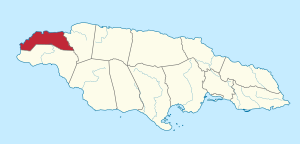Hanover Parish, Jamaica facts for kids
Hanover is one of the 14 parishes in Jamaica. It is located on the northwestern coast of the island, within the county of Cornwall. The capital town of Hanover is Lucea, a historic port town known for its beautiful harbour. Hanover is a smaller parish, but it is rich in history and natural beauty, making it a special part of Jamaica.
Contents
History of Hanover Parish
Hanover Parish was established in 1723. It was named after the British royal family, the House of Hanover, who were ruling Great Britain at the time. The parish was created from parts of the neighbouring parishes of Westmoreland and Saint James.
Early Economy and Development
In its early days, Hanover's economy was mainly based on agriculture. Large plantations grew sugar cane, coffee, and pimento. These crops were very important for trade, and Lucea Harbour became a busy port where goods were shipped in and out. The parish also played a role in the slave trade, which was a dark period in Jamaica's history. After slavery was abolished in 1834, the economy slowly shifted, and new ways of life emerged for the people of Hanover.
Significant Events and Figures
Hanover has seen many changes over the centuries. It was a place where many people fought for their freedom and rights. The parish has also been home to important figures in Jamaican history, though their stories are often less known than those from larger parishes. Today, Hanover continues to develop, blending its rich past with modern life.
Geography and Climate
Hanover is known for its beautiful coastline, rolling hills, and fertile lands. It covers an area of about 450 square kilometers (174 square miles).
Coastal Features and Beaches
The parish has several lovely beaches and coves along its northern coast. These areas are popular for swimming, sunbathing, and enjoying the clear Caribbean Sea. The coastline is also home to fishing villages where local fishermen bring in their daily catch.
Rivers and Natural Landscapes
Several rivers flow through Hanover, including the Great River, which forms part of its eastern border. These rivers provide water for agriculture and are also home to various plants and animals. The inland areas of Hanover feature lush green hills and valleys, which are perfect for farming and offer scenic views.
Weather Patterns
Hanover has a tropical climate, which means it is warm all year round. There are two main seasons: a dry season and a wet season. The wet season usually brings more rain, which helps the plants and crops grow. The parish can sometimes experience hurricanes, especially between June and November, so residents are always prepared for these natural events.
Population and Culture
Hanover is one of Jamaica's smaller parishes in terms of population. The people of Hanover are known for their friendly nature and strong community spirit.
Demographics and Communities
According to recent estimates, Hanover has a population of around 70,000 people. Most residents live in the capital, Lucea, and in smaller towns and villages scattered throughout the parish. The communities are close-knit, and people often know their neighbours well.
Local Traditions and Festivals
Like other parts of Jamaica, Hanover has a vibrant culture. Music, dance, and storytelling are important parts of daily life. Local festivals and events often celebrate the parish's history, agricultural heritage, and unique traditions. These gatherings are a great way for visitors to experience the true spirit of Hanover.
Cuisine and Local Delicacies
The food in Hanover is typical Jamaican cuisine, with a focus on fresh local ingredients. Seafood is very popular due to the parish's coastal location. Dishes like escovitch fish, steamed fish, and various seafood soups are common. You can also find traditional Jamaican favourites like ackee and saltfish, jerk chicken, and fresh fruits.
Economy and Tourism
Hanover's economy relies on a mix of agriculture, fishing, and a growing tourism industry.
Agricultural Products
Farming remains an important activity in Hanover. Farmers grow crops like sugar cane, bananas, and various root vegetables. Fishing is also a key industry, with many small fishing boats operating along the coast.
Tourism and Attractions
In recent years, tourism has become a significant part of Hanover's economy. The parish is close to popular tourist areas like Negril and Montego Bay, which helps attract visitors. Hanover offers a more relaxed and authentic Jamaican experience compared to some of the larger tourist hubs.
Lucea Harbour and Fort Charlotte
Lucea Harbour is a beautiful natural harbour that has been important for centuries. Overlooking the harbour is Fort Charlotte, a historic fort built by the British in the 1700s. Visitors can explore the old cannons and enjoy the scenic views of the harbour and the sea.
Dolphin Cove and Other Activities
Hanover is also home to attractions like Dolphin Cove, where visitors can interact with dolphins and other marine animals. There are also opportunities for river rafting, exploring caves, and enjoying the natural beauty of the parish. These activities help to attract tourists and provide jobs for local people.
Education and Infrastructure
Hanover has schools, health facilities, and other important services for its residents.
Schools and Learning Opportunities
The parish has several primary and secondary schools that provide education for children and teenagers. Efforts are continuously made to improve educational facilities and ensure that young people have access to good learning opportunities.
Transportation and Public Services
Roads connect Hanover to other parts of Jamaica, making travel relatively easy. Public transportation, like buses and route taxis, helps people move around the parish and to neighbouring towns. The parish also has health centres and other public services to support the well-being of its communities.
See also
 In Spanish: Parroquia de Hanover para niños
In Spanish: Parroquia de Hanover para niños
 | Chris Smalls |
 | Fred Hampton |
 | Ralph Abernathy |


